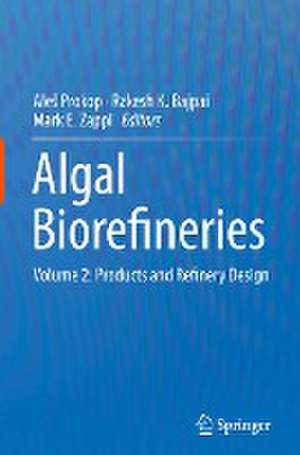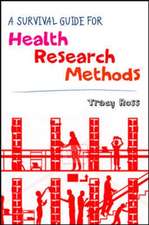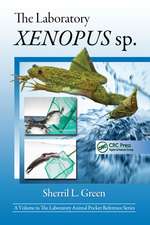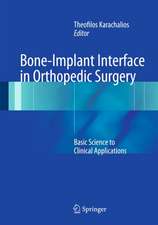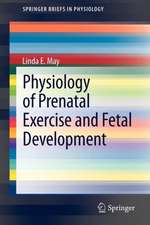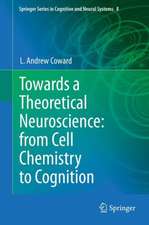Algal Biorefineries: Volume 2: Products and Refinery Design
Editat de Aleš Prokop, Rakesh K. Bajpai, Mark E. Zappien Limba Engleză Hardback – 28 oct 2015
| Toate formatele și edițiile | Preț | Express |
|---|---|---|
| Paperback (1) | 1109.08 lei 43-57 zile | |
| Springer International Publishing – 23 aug 2016 | 1109.08 lei 43-57 zile | |
| Hardback (1) | 1127.32 lei 22-36 zile | |
| Springer International Publishing – 28 oct 2015 | 1127.32 lei 22-36 zile |
Preț: 1127.32 lei
Preț vechi: 1186.66 lei
-5% Nou
Puncte Express: 1691
Preț estimativ în valută:
215.71€ • 225.82$ • 178.49£
215.71€ • 225.82$ • 178.49£
Carte disponibilă
Livrare economică 17-31 martie
Preluare comenzi: 021 569.72.76
Specificații
ISBN-13: 9783319201993
ISBN-10: 3319201999
Pagini: 557
Ilustrații: VIII, 557 p.
Dimensiuni: 155 x 235 x 35 mm
Greutate: 1.24 kg
Ediția:1st ed. 2015
Editura: Springer International Publishing
Colecția Springer
Locul publicării:Cham, Switzerland
ISBN-10: 3319201999
Pagini: 557
Ilustrații: VIII, 557 p.
Dimensiuni: 155 x 235 x 35 mm
Greutate: 1.24 kg
Ediția:1st ed. 2015
Editura: Springer International Publishing
Colecția Springer
Locul publicării:Cham, Switzerland
Public țintă
ResearchCuprins
Microalgal systems biology for biofuel production, Seong-Joo Hong and Choul-Gyun Lee.- Government regulation of the uses of genetically modified algae and other microorganisms in biofuel and bio-based chemical production, David J. Glass.- Algal heterotrophic and mixotrophic culturing for biorefinery: From metabolic routes to techno-economics, Octavio Perez-Garcia and Joav Bashan.- Algal Closed Reactor Design, .- Martin Koller.- Algal tubular reactor design, Graziella Chini-Zitelli and Giuseppe Torzillo.- Photobioreactors with internal illumination, Magda Sergejevová, Jose Romel Malapascua, Jiří Kopecký and Jiří Masojídek.- Thin-layer systems for mass cultivation of microalgae: flat panels and sloping cascades, Jiří Masojídek, Magda Sergejevová, José R. Malapascua and Jiří Kopecký.- Gas balances and growth in algal cultures, Marcai Morales, Juan Cabello and Sergio Revah.- Beneficial or toxic effects of selenium on green algae and their application as nutrient supplements or bio-remediators, Milada Vítová, Kateřina Bišová, Jiří Doucha and Vilém Zachleder.- Rare earth elements and algae: Physiological effects, biorefinery and recycling, Franz Goecke, Vilém Zachleder and Milada Vítová.- Utilization of biorefinery waste proteins as feed, glues, composites, and other co-products, William M Chirdon.- Utilization alternatives of algal wastes for solid algal products, Didem Özçimen, Benan İnan, Sevgi Akış and Anıl Tevfik Koçer.- Algal Cell Disruption and Lipid Extraction: A Review on Current Technologies and Limitations, Chandra S. Theegala.- Microalgal derived biomethanization and biohydrogen production – a review of modeling approaches, Marc Wichern and Manfred Lübken.- Hydrothermal pretreatment of macroalgal biomass for biorefineries, Héctor A. Ruiz, Rosa M Rodríguez-Jasso, Mario Aguedo and Zsófia Kádár.- Conversion of microalgae bio-oil into bio-diesel, Aimaro Sanna and Abd Rahman Nur Adilah.- A framework for sustainable design of algae biorefineries: Economic aspects and life cycle analysis, Peam Cheali, Carina Gargalo, Krist V Gernaey and Gürkan Sin.- Multi-actor life cycle assessment of algae-derived biofuels for U.S. airline industry, Datu Buyung Agusdinata and Daniel DeLaurentis.- Index.
Recenzii
“The contributors are well known scientists in their field under the leading authority of truly famous scientists acting as Editors. The chapters are written very clearly, having a very generous bibliography and useful illustrations.” (Prof. Ioan I. Ardelean, Bulletin of Micro and Nanoelectrotechnologies, Vol. 7 (3-4), 2015)
Textul de pe ultima copertă
Algae offer potential to produce renewable chemicals and fuels using solar energy and carbon dioxide from atmosphere or in flue gases while simultaneously reducing the generation of greenhouse gases. Since these can be grown on marginal lands with micronutrients and macronutrients often present in waste streams, algae-based chemicals and fuels do not compete with foods. Still large-scale production of algae-based fuels and chemicals faces considerable technological and economical challenges, and it would by necessity require a biorefinery approach wherein all the possible algal components are converted into value-added compounds. The present series on algal biorefineries represents a forum for reporting the state of the art of different technologies as well as the latest advances in this field. The volume II of this series complements the volume I in terms of the current state of the art. Different chapters in this volume address diverse issues ranging from genetically modifies algae to new products to life-cycle analysis of algal products.
Caracteristici
Important assessment of the state of the art in algae cultivation and processing Finding the latest advances in algal products For identifying the research needs relating to algal biorefineries For LCA and environmental impact of algal chemicals and fuels Includes supplementary material: sn.pub/extras
